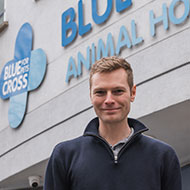Just because we can, does that mean we should?
The consensus view from the panel was that 'cost/benefit' discussions with the client are quite acceptable.
Experts consider different aspects of ethical choice facing small animal clinicians
At an innovative press conference at the BSAVA Congress, a panel of experts considered different aspects of ethical choices facing veterinary small animal clinicians.
Each of the members of the panel was asked to give their initial thoughts on the subject, 'Just because we can, does that mean we should?'
Speaking on behalf of the insurance industry, Howard Brown said that the problems of ethical decisions are not new for the pet insurance industry in which the price of a procedure is inevitably part of the decision-making equation.
David Catlow, a member of the RCVS Council, said he did not think it was a 'difficult era', but rather a time of change for the profession. "It is important that the veterinary profession plays a leading role in the debate," he said.
Hilary Orpet, representing the veterinary nursing profession, posed the question of whether there are nursing procedures and aspects of care that we should be considering.
Orthopaedic surgeon and clinical director, John Innes described a personal ethical dilemma involving his own dog. he emphasised that the three main criteria to consider are: pain, prognosis and price. "And we cannot ignore price," he said.
BSAVA president-elect, Tricia Colville, said that at a practice level, ethical issues and welfare matters should be a team decision, including informed discussion with the owners. It is very important to take note of the body language of clients because they will not necessarily say what they really feel.
Responding to a question from the floor asking whether the panel considered it was time to try and standardise an objective approach to assessing quality of life, John Innes said that there are already some tools available. He said this was particularly true in orthopaedics and that these guidelines were gradually being taken up in first-opinion practice.
Tricia Colville added that the opinion of the client is a critical part of the assessment process as they live with the animal and are, therefore, best placed to decide what is normal behaviour for their pet. Hilary Orpet endorsed this point and suggested that the primary role of nurses was about getting the animal back to its normal routine.
A question was asked about the effects of high profile TV programmes and their effects on client expectations at a practice level. This prompted a wealth of viewpoints – ranging from its being a good thing in raising the caring image of veterinary professionals and raising interest in pet insurance; to the negative effects of adding pressure to 'ordinary' vets at a first-opinion practice level as clients demanded expensive referral work on their own pets with no real awareness of the costs or welfare aspects involved.
The consensus view from the panel was that 'cost/benefit' discussions with the client are quite acceptable. These are useful to emphasise that 'costs' are not only financial but also include 'costs' placed on family routine and the quality of an animal's life. We are entering an era of health economics.
Although the legal responsibility for the welfare of an animal is ultimately with the owner, the veterinary professions have a duty to provide informed opinion and advice to try and guide clients towards making the appropriate decision. This is often more a question of good communication than anything else.







 The latest
The latest 
